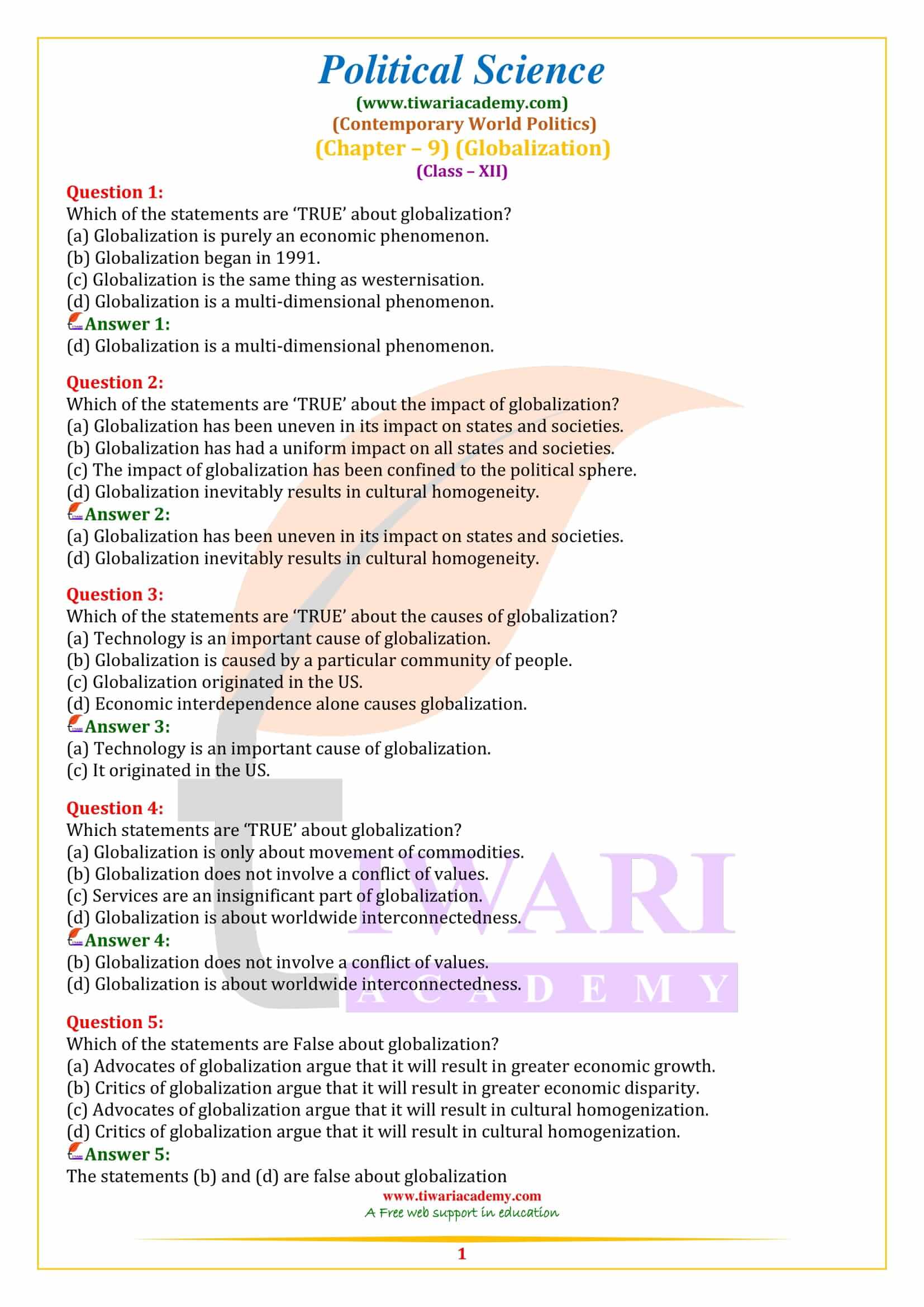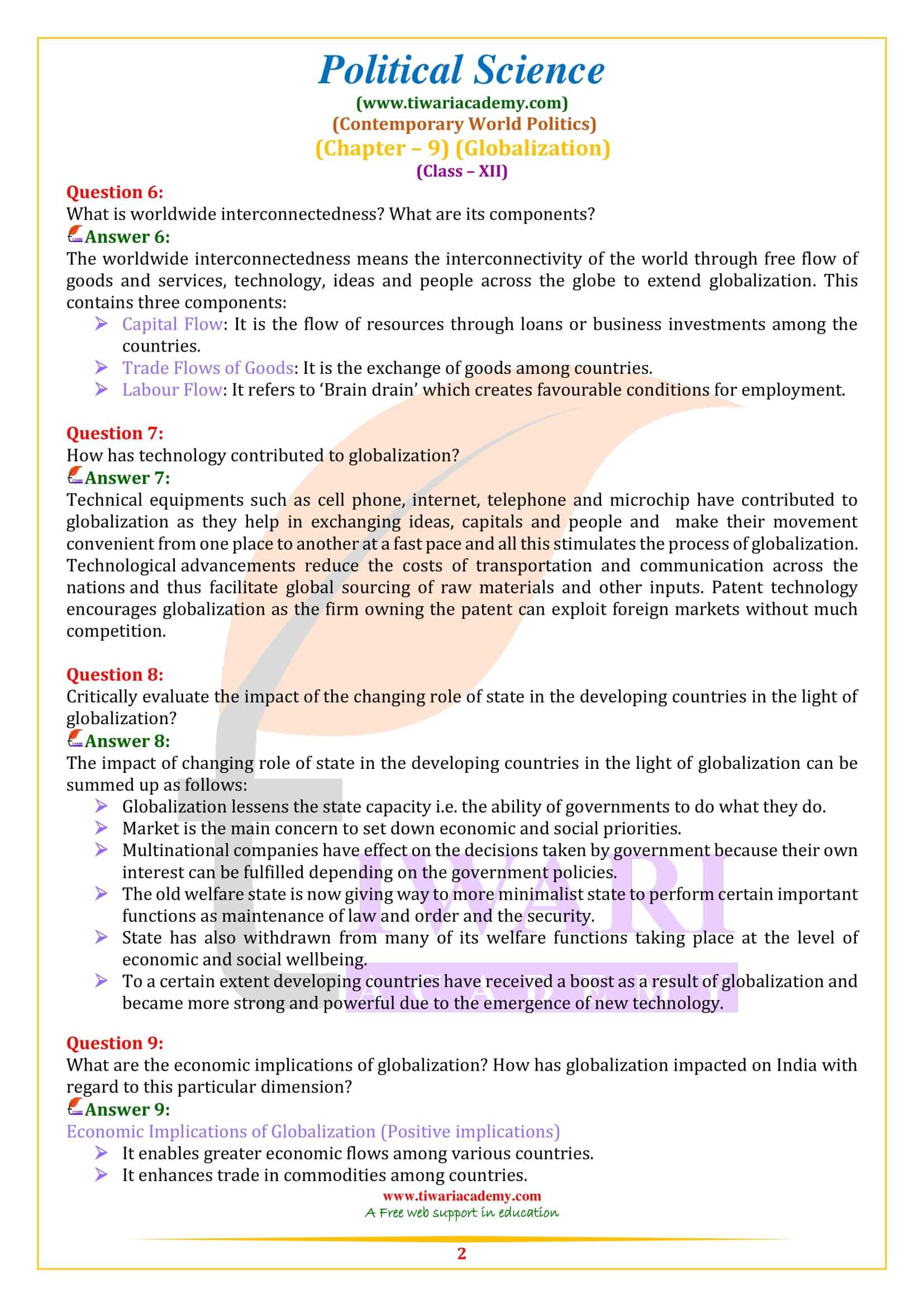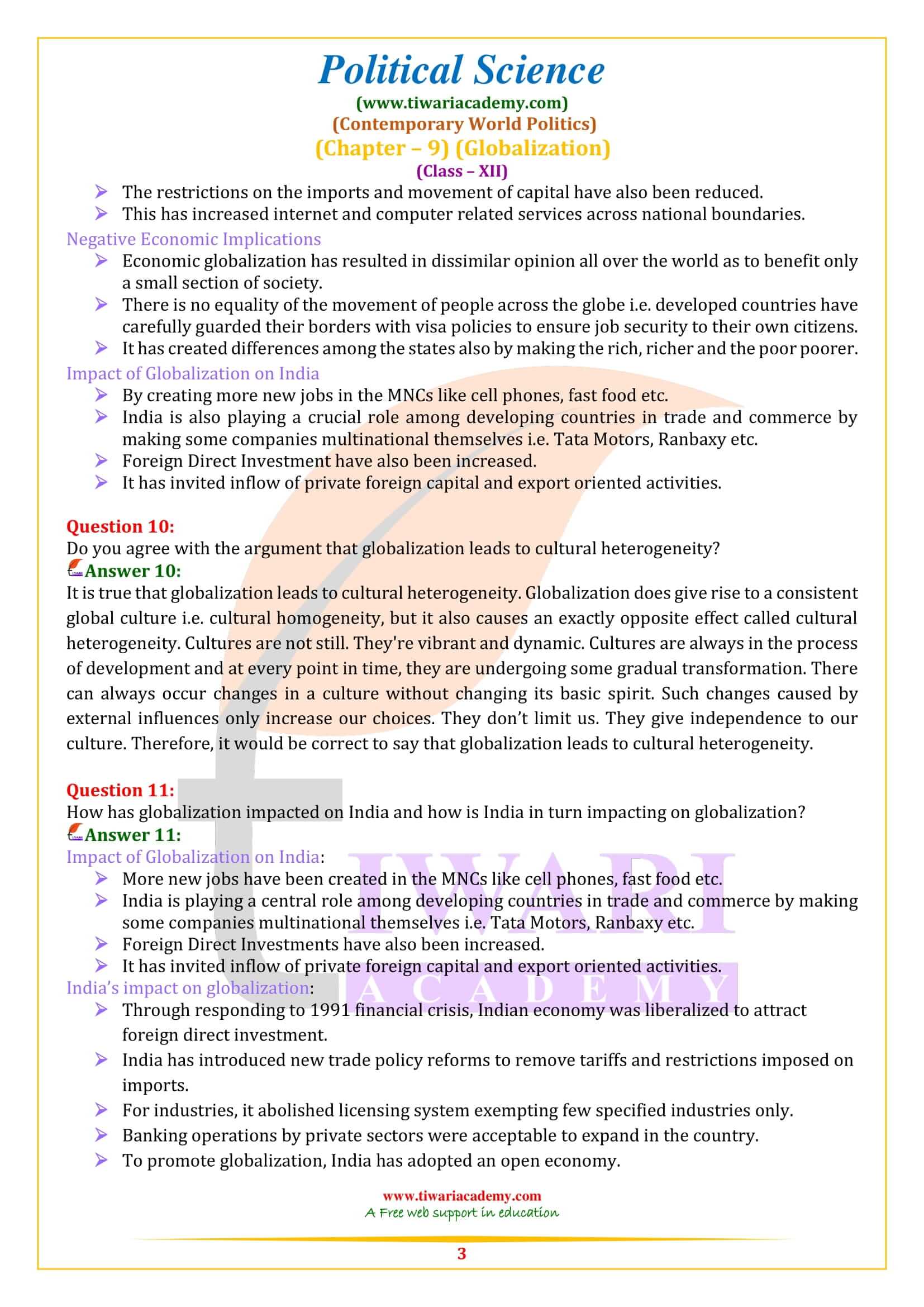NCERT Solutions for Class 12 Political Science Chapter 9 Globalisation updated for CBSE session 2025-26 based on latest NCERT Books. Get here the English and Hindi Medium solutions of Class 12 Political Science Part 1 Contemporary World Politics Chapter 9. All the content are free to use without any login.
NCERT Solutions for Class 12 Political Science Chapter 9
Class 12 Political Science Chapter 9 MCQ
Which of the statements are TRUE about globalization?
Which of the statements are TRUE about the impact of globalization?
Which of the statements are TRUE about the causes of globalization?
Which statements are TRUE about globalization?
What is worldwide interconnectedness? What are its components?
The worldwide interconnectedness means the interconnectivity of the world through free flow of goods and services, technology, ideas and people across the globe to extend globalization. This contains three components:
- Capital Flow: It is the flow of resources through loans or business investments among the countries.
- Trade Flows of Goods: It is the exchange of goods among countries.
- Labour Flow: It refers to ‘Brain drain’ which creates favourable conditions for employment.
How has technology contributed to globalization?
Technical equipment such as cell phone, internet, telephone and microchip have contributed to globalization as they help in exchanging ideas, capitals and people and make their movement convenient from one place to another at a fast pace and all this stimulates the process of globalization. Technological advancements reduce the costs of transportation and communication across the nations and thus facilitate global sourcing of raw materials and other inputs. Patent technology encourages globalization as the firm owning the patent can exploit foreign markets without much competition.
Critically evaluate the impact of the changing role of state in the developing countries in the light of globalization?
The impact of changing role of state in the developing countries in the light of globalization can be summed up as follows:
- Globalization lessens the state capacity i.e. the ability of governments to do what they do.
- Market is the main concern to set down economic and social priorities.
- Multinational companies have effect on the decisions taken by government because their own interest can be fulfilled depending on the government policies.
- The old welfare state is now giving way to more minimalist state to perform certain important functions as maintenance of law and order and the security.
- State has also withdrawn from many of its welfare functions taking place at the level of economic and social wellbeing.
- To a certain extent developing countries have received a boost as a result of globalization and became more strong and powerful due to the emergence of new technology.
What are the economic implications of globalization? How has globalization impacted on India with regard to this particular dimension?
Economic Implications of Globalization (Positive implications)
- It enables greater economic flows among various countries.
- It enhances trade in commodities among countries.
- The restrictions on the imports and movement of capital have also been reduced.
- This has increased internet and computer related services across national boundaries.
Negative Economic Implications
- Economic globalization has resulted in dissimilar opinion all over the world as to benefit only a small section of society.
- There is no equality of the movement of people across the globe i.e. developed countries have carefully guarded their borders with visa policies to ensure job security to their own citizens.
- It has created differences among the states also by making the rich, richer and the poor poorer.
Impact of Globalization on India
- By creating more new jobs in the MNCs like cell phones, fast food etc.
- India is also playing a crucial role among developing countries in trade and commerce by making some companies multinational themselves i.e. Tata Motors, Ranbaxy etc.
- Foreign Direct Investment have also been increased.
- It has invited inflow of private foreign capital and export oriented activities.
Do you agree with the argument that globalization leads to cultural heterogeneity?
It is true that globalization leads to cultural heterogeneity. Globalization does give rise to a consistent global culture i.e. cultural homogeneity, but it also causes an exactly opposite effect called cultural heterogeneity. Cultures are not still. They’re vibrant and dynamic. Cultures are always in the process of development and at every point in time, they are undergoing some gradual transformation. There can always occur changes in a culture without changing its basic spirit. Such changes caused by external influences only increase our choices. They don’t limit us. They give independence to our culture. Therefore, it would be correct to say that globalization leads to cultural heterogeneity.
How has globalization impacted on India and how is India in turn impacting on globalization?
Impact of Globalization on India:
- More new jobs have been created in the MNCs like cell phones, fast food etc.
- India is playing a central role among developing countries in trade and commerce by making some companies multinational themselves i.e. Tata Motors, Ranbaxy etc.
- Foreign Direct Investments have also been increased.
- It has invited inflow of private foreign capital and export oriented activities.
India’s impact on globalization:
- Through responding to 1991 financial crisis, Indian economy was liberalized to attract foreign direct investment.
- India has introduced new trade policy reforms to remove tariffs and restrictions imposed on imports.
- For industries, it abolished licensing system exempting few specified industries only.
- Banking operations by private sectors were acceptable to expand in the country.
- To promote globalization, India has adopted an open economy.




